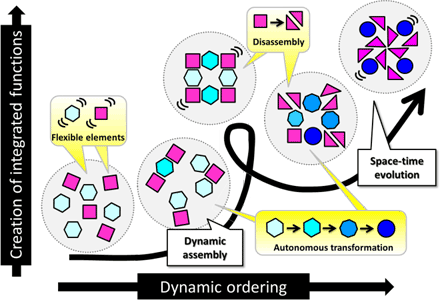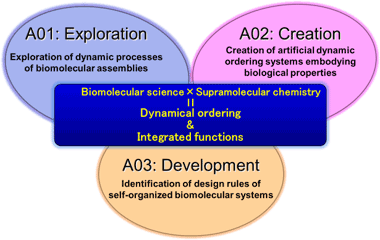Purpose of the Research Project
Living systems are characterized as dynamic processes of assembly and disassembly of various biomolecules that are self-organized, interacting with the external environment. The omics-based approaches developed in recent decades have provided comprehensive information regarding biomolecules as parts of living organisms. However, fundamental questions still remain unsolved as to how these biomolecules are ordered autonomously to form flexible and robust systems.
This multidisciplinary research area, including fields of chemistry, physics, and biology, aims to elucidate the mechanisms underlying the dynamic ordering of biomolecules that have internal complexities for the creation of integrated functions.
 Conceptual diagram of dynamical ordering of biomolecular systems.
Conceptual diagram of dynamical ordering of biomolecular systems.
Content of the Research Project
In this research area, we propose three research topics: Exploration (A01), Creation (A02), and Development (A03) of Biomolecular Dynamic Ordering. In A01, the dynamic processes of biomolecular assemblies will be extensively explored by combination of experimental and theoretical approaches. In A02, dynamic ordering systems embodying biological properties will be artificially created using supramolecular chemistry in conjunction with biomolecular science. In A03, the design rules of self-organized biomolecular systems will be identified by characterizing their vested instability and robustness against external perturbations in order to obtain insights into the principles governing their space-time evolution coupled with the development of their integrated functions.
 Overview of the project.
Overview of the project.
Expected Research Achievements and Scientific Significance
Our research project will facilitate an integrated understanding of the principles behind the molecular ordering processes of various biological events and promote our ability to generate artificial bioordering through a coordinated interplay between biomolecular science and supramolecular chemistry. Our achievements will not only contribute to industrial applications such as pharmaceutical innovations but also provide deeper insights into life sciences in general as we move toward a paradigm shift in molecular science by developing guiding principles toward design and creation of artificial living systems.
